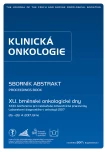-
Medical journals
- Career
Analysis of DNA Methylation in BRCA2 Gene Using Electrode Biochips
Authors: M. Bartošík 1; D. Bartáková 2
Authors‘ workplace: Masarykova univerzita, Brno 2
Published in: Klin Onkol 2017; 30(Supplementum1): 149-152
Category: Article
Overview
Background:
Since DNA methylation results in gene silencing, it plays an important role in cell proliferation and differentiation. Abnormal DNA methylation is often associated with carcinogenesis, and therefore its analysis could be an interesting option in early diagnostics of cancer, determination of tumour invasiveness, progression or metastatic potential. One of the methods for DNA analysis could be also electrochemistry, which offers inexpensive instrumentation, short measurement times and parallel detection of samples.Material and Methods:
We have analyzed methylation status of a DNA site within BRCA2 gene promoter sequence, which is associated with breast cancer. We hybridized this sequence at magnetic beads and then we incubated them with methylation-sensitive restriction endonuclease BstUI, which specifically cleaves non-methylated restriction site CGCG, but not methylated one. After addition of labeled DNA probe and peroxidase, we monitored enzymatic reaction at the electrode chip.Results:
First, we tested suitability of designed DNA probes and effectiveness of BstUI cleavage using gel electrophoresis. Afterwards, we applied these probes and the enzyme to the magnetic beads, with the final detection at the electrode chip. We show good correlation of electrochemical and electrophoresis results, i.e. that labelled DNA probe was removed only when DNA containing non-methylated restriction site was incubated with BstUI. When this restriction site was methylated, no cleavage occurred and the resulting signal was high. We also show good reproducibility of the measurement.Conclusion:
Electrochemical detection, in combination with magnetic beads and restriction enzymes, could be a potentially useful tool for determination of methylation status of a specific DNA sequence.Key words:
DNA methylation – DNA restriction enzymes – electrochemistry – nucleic acid hybridization
This work was supported by MEYS – NPS I – LO1413.
The authors declare they have no potential conflicts of interest concerning drugs, products, or services used in the study.
The Editorial Board declares that the manuscript met the ICMJE recommendation for biomedical papers.Submitted:
6. 3. 2017Accepted:
26. 3. 2017
Sources
1. Herman JG, Baylin SB. Mechanisms of disease: Gene silencing in cancer in association with promoter hypermethylation. New Engl J Med 2003; 349 (21): 2042–2054.
2. Esteller M, Silva JM, Dominguez G et al. Promoter hypermethylation and BRCA1 inactivation in sporadic breast and ovarian tumors. J Natl Cancer Inst 2000; 92 (7): 564–569.
3. Delpu Y, Cordelier P, Cho WC et al. DNA methylation and cancer diagnosis. Int J Mol Sci 2013; 14 (7): 15029–15058. doi: 10.3390/ijms140715029.
4. Bartošík M, Ondroušková E. Nové metody studia metylace DNA – MS-HRM analýza a elektrochemie. Klin Onkol 2016; 29 (Suppl 4): 64–71.
Labels
Paediatric clinical oncology Surgery Clinical oncology
Article was published inClinical Oncology

2017 Issue Supplementum1-
All articles in this issue
- MicroRNA Analysis in Epithelial Ovarian Cancer
- Use of Porous Hydrogel as a 3D Scaffold for the Growth of Leukemic B Lymphocytes
- Ascites May Provide Useful Information for Diagnosis of Ovarian Cancer
- Diagnostic and Therapeutic Potential of Membrane HSP90
- Everolimus in Daily Clinical Practice Focusing to Oral Mucosa Damage Issues – Single Oncology Centre Experience within the Course of the Year 2016
- Analysis of DNA Methylation in BRCA2 Gene Using Electrode Biochips
- Molecular Pathology of Colorectal Cancer, Microsatellite Instability – the Detection, the Relationship to the Pathophysiology and Prognosis
- Lactate Dehydrogenase – Old Tumour Marker in the Light of Current Knowledge and Preanalytic Conditions
- Application of PLA Method for Detection of p53/p63/p73 Complexes in Situ in Tumour Cells and Tumour Tissue
- The Importance of MicroRNA Deregulation in the Molecular Pathogenesis and Histological Transformation of Follicular Lymphoma
- Circulating Myeloid Suppressor Cells and Their Role in Tumour Immunology
- Can we Observe Ethnic Difference in Basic Blood Tests? Single-institution Data from Cancer Prevention Programme in the Czech Republic
- Zinc-modified Nanotransporter for Target Drug Therapy of Breast Cancer
- Fullerene Doxorubicin Nanotransporter for Target Interaction with mutated gene BRCA2
- Clinical Oncology
- Journal archive
- Current issue
- Online only
- About the journal
Most read in this issue- Ascites May Provide Useful Information for Diagnosis of Ovarian Cancer
- Lactate Dehydrogenase – Old Tumour Marker in the Light of Current Knowledge and Preanalytic Conditions
- Molecular Pathology of Colorectal Cancer, Microsatellite Instability – the Detection, the Relationship to the Pathophysiology and Prognosis
- Circulating Myeloid Suppressor Cells and Their Role in Tumour Immunology
Login#ADS_BOTTOM_SCRIPTS#Forgotten passwordEnter the email address that you registered with. We will send you instructions on how to set a new password.
- Career

